With Internet advertising now thoroughly pwned by Google, the company is now looking to break into TV advertising.
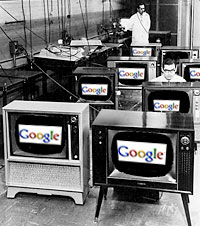 The company is set to unveil deals today with satellite TV service EchoStar Communications and Astound Cable in the US to broker commercials in a similar way to how it offers online advertising.
The company is set to unveil deals today with satellite TV service EchoStar Communications and Astound Cable in the US to broker commercials in a similar way to how it offers online advertising.
Advertisers will be able to upload adverts to the company’s website and plug in to an automated system to select channel, time and geographical preferences.
Just like the current AdWords system, an auction then determines whether the ads get placed and for what price.
Keval Desai, product management director for Google TV ads, described the new TV scheme as being, “very similar to what we are doing on the Web. TV is becoming like the Web.”
 During the television pilot, Google will serve commercials to EchoStar’s Dish Network satellite channels, a US service which enjoys around 13.1 million subscribers. The adverts won’t look any different to regular ones, carrying no Google branding and appearing in the usual time slots.
During the television pilot, Google will serve commercials to EchoStar’s Dish Network satellite channels, a US service which enjoys around 13.1 million subscribers. The adverts won’t look any different to regular ones, carrying no Google branding and appearing in the usual time slots.
Google say that advances in set-top-box technologies have made it possible for them to report aggregate statistics on how many times an ad was viewed and whether folks watched it through to the end.
“Advertisers can use this data to understand the effectiveness of their TV ad campaigns and use this information to provide more relevant ads to viewers,” the company added.
 LG have committed to release at least ten new mobile phone and will jointly market them as LG-Google handsets.
LG have committed to release at least ten new mobile phone and will jointly market them as LG-Google handsets. Sitting on the tube, opposite such an ad, I figured that there were only two possible companies which could be accused of controlling 80% of information on the Web; it could plausibly refer to either Internet Explorer’s market share (and would therefore be an advert for Firefox) or Google’s market share. Since I knew Mozilla wasn’t planning any advert like this, I assumed that it was a competitor to Google, and concluded it was probably Ask (since neither Yahoo or Microsoft would manage to think outside the box to such an extent). However, I dismissed that idea instantly as it seemed so unlikely that a well respected company would attempt such a pathetic campaign, and that therefore it must be some new search engine with far too much venture capital. By that point I had lost interest, and began examining the ventilation panel.
Sitting on the tube, opposite such an ad, I figured that there were only two possible companies which could be accused of controlling 80% of information on the Web; it could plausibly refer to either Internet Explorer’s market share (and would therefore be an advert for Firefox) or Google’s market share. Since I knew Mozilla wasn’t planning any advert like this, I assumed that it was a competitor to Google, and concluded it was probably Ask (since neither Yahoo or Microsoft would manage to think outside the box to such an extent). However, I dismissed that idea instantly as it seemed so unlikely that a well respected company would attempt such a pathetic campaign, and that therefore it must be some new search engine with far too much venture capital. By that point I had lost interest, and began examining the ventilation panel.
 GodTube, you won’t be surprised to hear, shows videos that praise god. It’s yet to launched, with the expected out-of-beta date being 1 May.
GodTube, you won’t be surprised to hear, shows videos that praise god. It’s yet to launched, with the expected out-of-beta date being 1 May.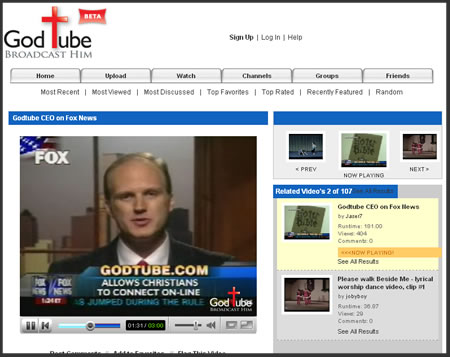
 For folks a little bored of staring at the vast expanses of white space around their Google homepage comes the news that the page is finally skinnable.
For folks a little bored of staring at the vast expanses of white space around their Google homepage comes the news that the page is finally skinnable. All of themes are dynamic and change their appearance according to your own local time of day, current weather conditions or season.
All of themes are dynamic and change their appearance according to your own local time of day, current weather conditions or season.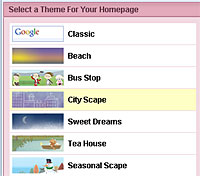 Personally, we couldn’t think of anything worse than being stuck in a windowless office and relying on Google to tell you when the sun has gone down, but we get her point.
Personally, we couldn’t think of anything worse than being stuck in a windowless office and relying on Google to tell you when the sun has gone down, but we get her point. Rumours that Google is working on a mobile phone were given another boost after Richard Windsor, of Nomura brokers, claimed that Google reps at an industry event in Germany had blabbed about such a device.
Rumours that Google is working on a mobile phone were given another boost after Richard Windsor, of Nomura brokers, claimed that Google reps at an industry event in Germany had blabbed about such a device.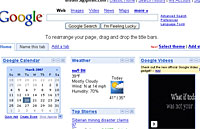 Pundits reckon that Google would be most likely to shuffle into the mobile world under a deal that would let them partner with an existing handset maker and hop on to the network of an existing mobile operator.
Pundits reckon that Google would be most likely to shuffle into the mobile world under a deal that would let them partner with an existing handset maker and hop on to the network of an existing mobile operator. Two deals have been done, one with the BBC, the other BBC Worldwide, the commercial arm of the BBC. Financial terms of the deal aren’t being discussed at all.
Two deals have been done, one with the BBC, the other BBC Worldwide, the commercial arm of the BBC. Financial terms of the deal aren’t being discussed at all. Research firm Hitwise reported that online traffic to YouTube soared past rival US TV websites, with the site recording more visits than all the television network Web sites combined during the week of Feb. 3rd.
Research firm Hitwise reported that online traffic to YouTube soared past rival US TV websites, with the site recording more visits than all the television network Web sites combined during the week of Feb. 3rd. Hitwise researcher LeAnn Prescott, commented, “This is a landmark event in the changing face of web traffic and entertainment consumption, now that entertainment seekers are now more likely to go to YouTube than any other television network or gaming website.”
Hitwise researcher LeAnn Prescott, commented, “This is a landmark event in the changing face of web traffic and entertainment consumption, now that entertainment seekers are now more likely to go to YouTube than any other television network or gaming website.” Looking deeper, deeper, deeper into his shiny orb (oo-er), the beardy Cerf revealed that it won’t be personal computers fuelling the growth of the internet. Instead he reckons that the expansion of the worldwide web will be powered by mobile phones, with countries like India snapping up zillions of the fellas and getting online en masse.
Looking deeper, deeper, deeper into his shiny orb (oo-er), the beardy Cerf revealed that it won’t be personal computers fuelling the growth of the internet. Instead he reckons that the expansion of the worldwide web will be powered by mobile phones, with countries like India snapping up zillions of the fellas and getting online en masse.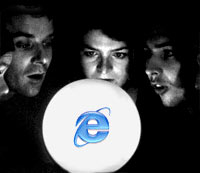 “The mobile phone has become an important factor in the Internet revolution,” he added.
“The mobile phone has become an important factor in the Internet revolution,” he added. The case was brought by Copiepresse, a copyright protection organisation that was representing 17 [UPDATE (thanks Michel) French-speaking] Belgian newspapers, complaining that both Google’s search and News service were in breach.
The case was brought by Copiepresse, a copyright protection organisation that was representing 17 [UPDATE (thanks Michel) French-speaking] Belgian newspapers, complaining that both Google’s search and News service were in breach.